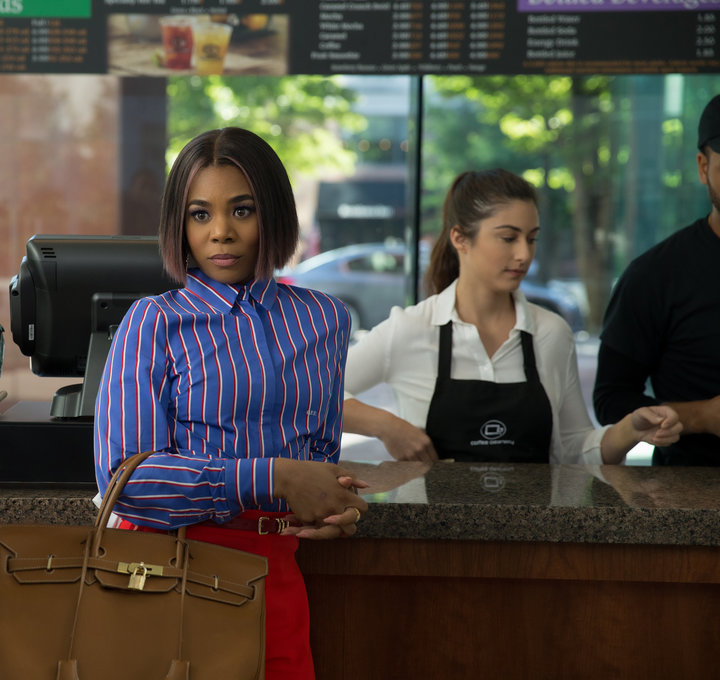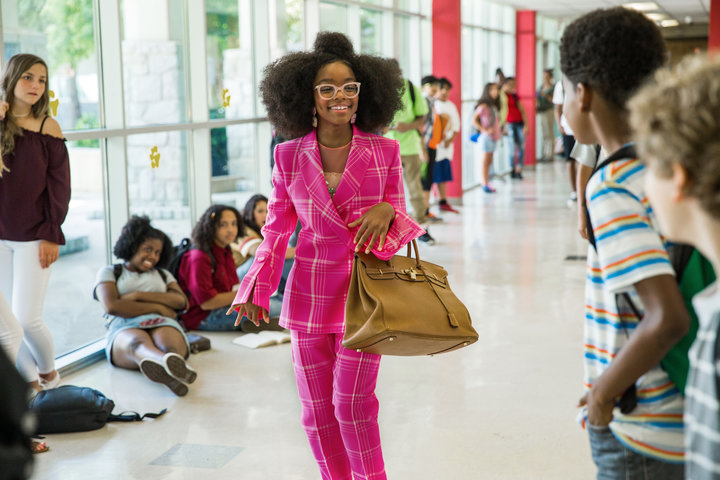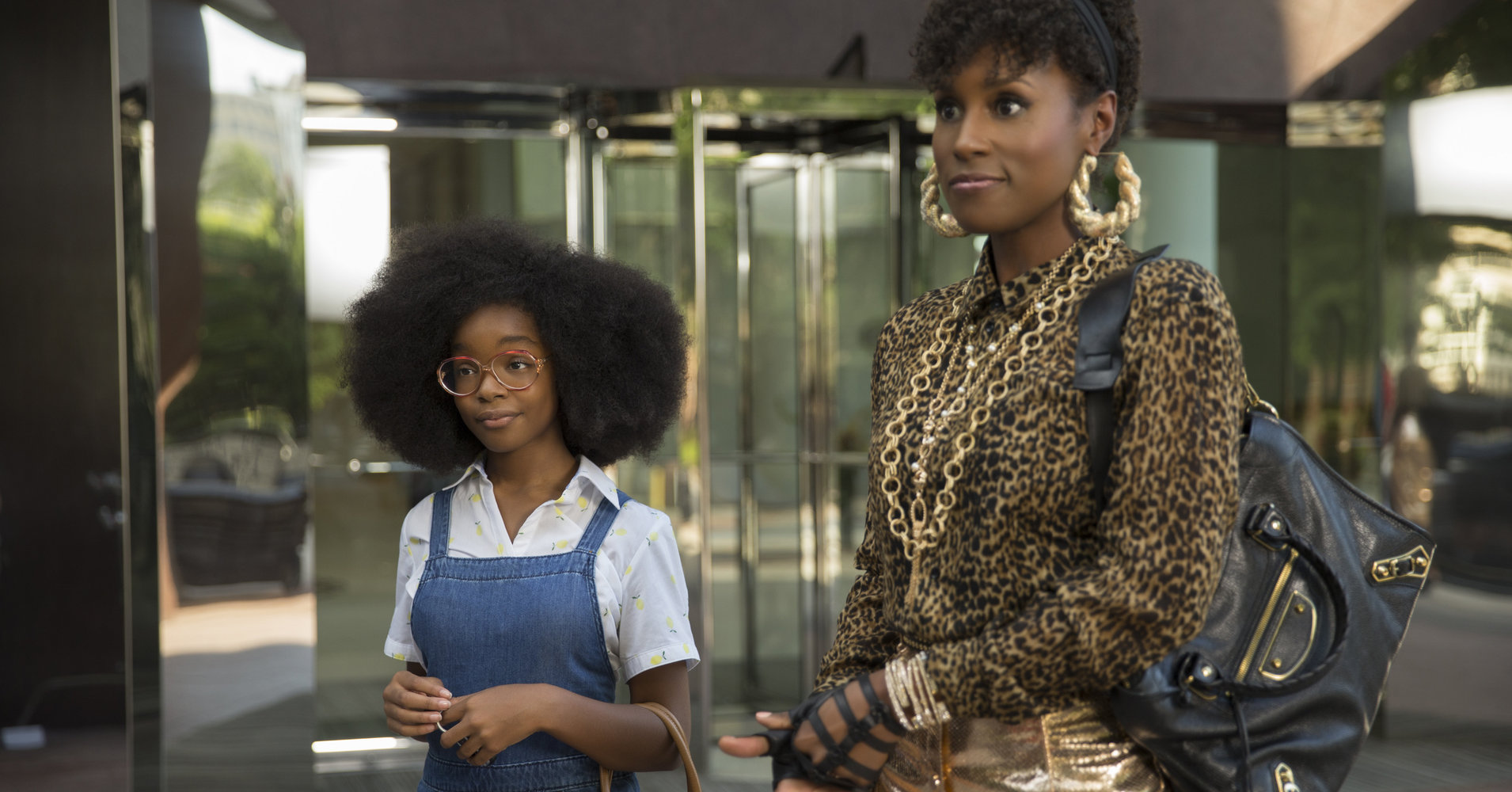[ad_1]
The body-switch comedy has become an improbable Hollywood mainstay, with “Little” marking the latest in a long line of movies that remix the “Freaky Friday” formula. It does for an egomaniacal businesswoman what “Big” did for a suburban teen boy, “The Change-Up” for men seeking alternative domestic realities and “Peggy Sue Got Married” for a soon-to-be divorcée fleeing her philandering husband. The circumstances from movie to movie are different — “What Women Want” and “What Men Want” twist the premise but barely satisfy their titles’ quandaries — yet the protagonists always reap the same reward: After a series of mistaken-identity mishaps, they emerge with a renewed appreciation for the lives they lead. Rinse and repeat.
“Little” even goes so far as to comment on its plot’s familiarity. When browbeating tech mogul Jordan Sanders (Regina Hall) awakens as her 13-year-old self (“Black-ish” scene-stealer Marsai Martin), Jordan’s overtaxed assistant April (Issa Rae) reminds her that body swapping has historically been a Caucasian pastime. “That’s for white people,” she sighs, “because black people don’t have the time.”
It’s a fair punchline considering the conceit would be at home in a Shakespeare farce or the Victorian novel “Vice Versa,” which, of course, was made into a 1988 movie starring Judge Reinhold and Fred Savage. But aside from finally letting nonwhite actors join the antics, this mini-genre hasn’t found anything fresh to do or say in the years since “Being John Malkovich” and “13 Going On 30.” Whatever magical claptrap pushes unsuspecting characters from one physique to another has grown steadily less clever, as “Little” demonstrates. I won’t spoil how director Tina Gordon, who co-wrote the script with “Girls Trip” scribe Tracy Oliver, transforms Jordan into a teenager, but let’s just say it seems like a method you could try at home. What good is Zoltar when all you need is a $3 prop from Party City?

“Little” instead coasts on the charms of its cast, which is the most we can hope for at this point. In that regard, it’s a delight. Hall, who has remained an undervalued comedic powerhouse since the “Scary Movie” series, barks insults in her upper register, conveying a perpetual state of supremacy. (She has the wardrobe and sports car to back it up.) When Jordan arrives at the office, an employee is likely to yell, “She’s here! Everyone take cover,” after which Hall glides through the building, arms outstretched so she occupies as much space as possible.
Hall is the perfect foil for Rae, who’s operating in a mode that parallels her winning HBO series “Insecure.” Rae has a knack for characters who project false confidence; her facial expressions are a journey, externalizing every win or loss as if it’s rooted in her soul. When we first meet April, she’s listening to an audiobook titled “So You Want to Slap Your Boss?” — a rare moment of zen before the underpaid, obsequious workhorse plasters on a fake smile to survive the day.
And what a day it is. On the cusp of losing her top client (“Saturday Night Live” player Mikey Day), Jordan angers the wrong preteen (Marley Taylor) milling around her office. The next morning, much to her disdain, she’s suddenly 13 again. That means she’ll need to return to the underworld known as middle school, where she once vowed to outmaneuver the classmates who bullied her by becoming a bully herself. Martin replaces Hall for most of the film, but you won’t mind: Channeling an adult trapped in a child’s body, she takes the MVP crown, adopting Hall’s hyper-assured mania so as to seem nervy beyond her years.
Martin, a 14-year-old who is now the youngest executive producer in Hollywood history after pitching this “Big” update to “Black-ish” creator Kenya Barris, has a preternatural glow that can’t be learned. Just watch her try to woo a handsome teacher (Justin Hartley) with innuendoes, ignoring the fact that she appears to him in teenage form. Martin captures the uncanny age disparity with the same finesse that Jodie Foster and Lindsay Lohan displayed in their respective “Freaky Friday” editions.

As April figures out how to reverse the spell, “Little” careens through predictable territory. There are hearty laughs along the way, but the gambit overstays its welcome, running into several plot holes as it picks up steam. We all know how this will end and exactly what the message will be: The social politics of our youth follow us into adulthood, by which point we’re too hardened to smell the proverbial breeze. “I got big and I got rich,” adult Jordan brags before she’s miniaturized, unaware that she is indicting the corporate ascendence on which identity is built. Anticipating the precise fate that awaits each character, you might beg “Little” not to tie such a pretty bow on its final moments. The skilled actors deserve a less canned ending, and so do we.
Where does the body-swap comedy go from here? As of late, it’s morphed into the head-bump comedy (though “comedy” is often a loose label), in which women smash their noggins and believe they’re different version of themselves (see: “Overboard,” “I Feel Pretty,” “Isn’t It Romantic”). It’s all an extension of late capitalism’s obsession with self-empowerment fodder that reminds us to love our bodies and treasure our surroundings. Other people’s lives aren’t so enviable after all, right? To thine own self be true, etc., etc. etc. But we can only be spoon-fed the same message so often and still find it heartwarming. As someone wise once said, who has the time?
“Little” opens April 12.
[ad_2]
Source link

